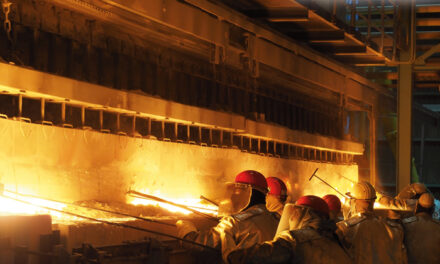
Aluminum manufacturer relies on Siemens technology and expertise for pilot plant
Karmøy Island/Norway. Norsk Hydro produces and supplies aluminum to customers around the world. The production of this lightweight but stable material uses an enormous amount of energy. In a bid to cut its energy requirement, the Norwegian company is setting up a pilot aluminum production plant on the Norwegian island of Karmøy with unique environmental credentials in terms of energy consumption, emissions and efficiency. Siemens is supplying the technology for the plant, which consumes up to 15 percent less energy than comparable projects, and will also be assuming responsibility for system integration and commissioning.
We come across it everywhere in our daily lives – in buildings, cars, aircraft, ships, household appliances, PCs and packaging: Aluminum is a highly lightweight but at the same time stable material with versatile uses. The downside: Its manufacture requires huge amounts of energy, amounting on average to 14 kilowatt hours per kilogram. The globally operating aluminum producer Norsk Hydro (Hydro) based in Norway is currently implementing a project on the Norwegian island of Karmøy which it envisages will set whole new standards for aluminum production.
Hydro’s aim: to construct the world’s greenest, most efficient aluminum factory ever. To implement this ambitious project, Hydro is relying on Siemens to provide the technology with its components and expertise, and to take charge of system integration and commissioning.
Project of superlatives
With a length of 34 meters and encompassing 25 switch panels, the high-current and generator switchgear supplied by Siemens for the project is the largest the company has ever constructed. The equipment supplied includes a VB1 generator circuit-breaker switchgear with vacuum switching technology and direct current supply.
The system solution protects devices such as transformers and generators from overvoltage and short circuits. Six converters, each configured for over 100 kilo amperes (kA) of direct current, work with the associated control and protection systems to ensure an uninterrupted power supply. These convert AC and DC current for operating the power-intensive smelting furnaces.
The Simatic PCS 7 including distributed I/O is used as the process control system.
High loading capacity
To ensure that the plant carries on functioning without problems following commissioning, one of the total of 26 switch panels was subjected to exhaustive advance testing to determine whether it was able to withstand overvoltage for a defined time
period without spark formation or discharge. The remaining 25 panels were only constructed once the tests had been completed with satisfactory results.
Following its completion, the pilot plant is set to produce around 75,000 tons of aluminum a year. Using just 11.8 kilowatt hours per kilo of aluminum produced, the facility will require around 15 percent less energy than aluminum production plants currently in existence






